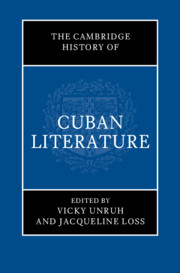Book contents
- The Cambridge History of Cuban Literature
- The Cambridge History of Cuban Literature
- Copyright page
- Dedication
- Contents
- Figures
- Contributors
- Acknowledgments
- Introduction Unfinished Histories
- Part I Literature in the Early Colony
- Part II Cuban Literature’s Long Nineteenth Century
- Part III Literary and Intellectual Culture in the Twentieth-Century Republic
- Part IV The Revolution’s Literary-Cultural Initiatives and Their Early Discontents
- Part V Cuba and Its Diasporas into the New Millennium
- 31 Alternative Cultural Projects and Their Histories
- 32 Ediciones Vigía and the Cultural Legacies of Matanzas
- 33 The Fiction of Cuba’s Special Period
- 34 Critique and Decentralization in Cuban Film After 1989
- 35 The Temporality of Twentieth- and Twenty-First-Century Cuban Theater
- 36 The Long Reach of Haiti in Cuban Literature
- 37 Cuban Afterlives of the Cuban and Angolan Revolutions
- 38 Anti-Exceptionalism in Detective Fiction, Speculative Fiction, and Graphic Novels
- 39 Cuban Women’s Writing at the Turn of the Millennium
- 40 Queering the Revolution and Its Diasporas
- 41 The Performance Art of Global Cuba
- 42 Twenty-First-Century Cuban Film and Diaspora
- 43 Cuba’s Poetic Imaginary (1989–2020)
- 44 Prose Narratives from Cuban America
- 45 Cuban Theater of the Diaspora in the United States
- Epilogue
- Select Bibliography
- Index
- References
35 - The Temporality of Twentieth- and Twenty-First-Century Cuban Theater
from Part V - Cuba and Its Diasporas into the New Millennium
Published online by Cambridge University Press: 31 August 2024
- The Cambridge History of Cuban Literature
- The Cambridge History of Cuban Literature
- Copyright page
- Dedication
- Contents
- Figures
- Contributors
- Acknowledgments
- Introduction Unfinished Histories
- Part I Literature in the Early Colony
- Part II Cuban Literature’s Long Nineteenth Century
- Part III Literary and Intellectual Culture in the Twentieth-Century Republic
- Part IV The Revolution’s Literary-Cultural Initiatives and Their Early Discontents
- Part V Cuba and Its Diasporas into the New Millennium
- 31 Alternative Cultural Projects and Their Histories
- 32 Ediciones Vigía and the Cultural Legacies of Matanzas
- 33 The Fiction of Cuba’s Special Period
- 34 Critique and Decentralization in Cuban Film After 1989
- 35 The Temporality of Twentieth- and Twenty-First-Century Cuban Theater
- 36 The Long Reach of Haiti in Cuban Literature
- 37 Cuban Afterlives of the Cuban and Angolan Revolutions
- 38 Anti-Exceptionalism in Detective Fiction, Speculative Fiction, and Graphic Novels
- 39 Cuban Women’s Writing at the Turn of the Millennium
- 40 Queering the Revolution and Its Diasporas
- 41 The Performance Art of Global Cuba
- 42 Twenty-First-Century Cuban Film and Diaspora
- 43 Cuba’s Poetic Imaginary (1989–2020)
- 44 Prose Narratives from Cuban America
- 45 Cuban Theater of the Diaspora in the United States
- Epilogue
- Select Bibliography
- Index
- References
Summary
This chapter examines the recurrent search for self-determination and identity at the core of modern Cuban theater, a search portrayed as embodied in theater’s own distinctive engagement with time. The chapter locates the birth of modern Cuban theater between 1902 and 1959 as a point of departure to elaborate upon representations of family and the disintegrating republic in the mid-twentieth century, characterized by a nonprogressive temporality within works by Virgilio Piñera and José Triana. The past, contrasted to the utopian-seeking, revolutionary present, unfolds in work by, for example, Abelardo Estorino and Eugenio Espinosa Hernández, the chapter argues. However, the chapter suggests that, by the end of the twentieth century, such a paradigm was replaced by undeniable frustration and desire for change in work, for example, by Alberto Pedro Torriente and Ulises Rodríguez Febles, as well as within the many new theater collectives, for example El Ciervo Encantado, that arose in the midst of the socioeconomic and political crisis of the Special Period and beyond.
Keywords
- Type
- Chapter
- Information
- The Cambridge History of Cuban Literature , pp. 549 - 563Publisher: Cambridge University PressPrint publication year: 2024

